International Security (International Security)
VerifiedAdded on 2022/08/16
|8
|2265
|17
AI Summary
6 6INTERNATIONAL SECURITY INTERATIONAL SECURITY INTERNATIONAL SECURITY Name of the Student Name of the University Author Note International security is also known as global security that refers to the measures that are taken by the state as well as international organizations like the United Nations to ensure survival as well as safety. International security is always linked with studies of international relations (Jackson, Srensen, and Mller 2019). Therefore the primary aim of the essay is to discuss international security
Contribute Materials
Your contribution can guide someone’s learning journey. Share your
documents today.
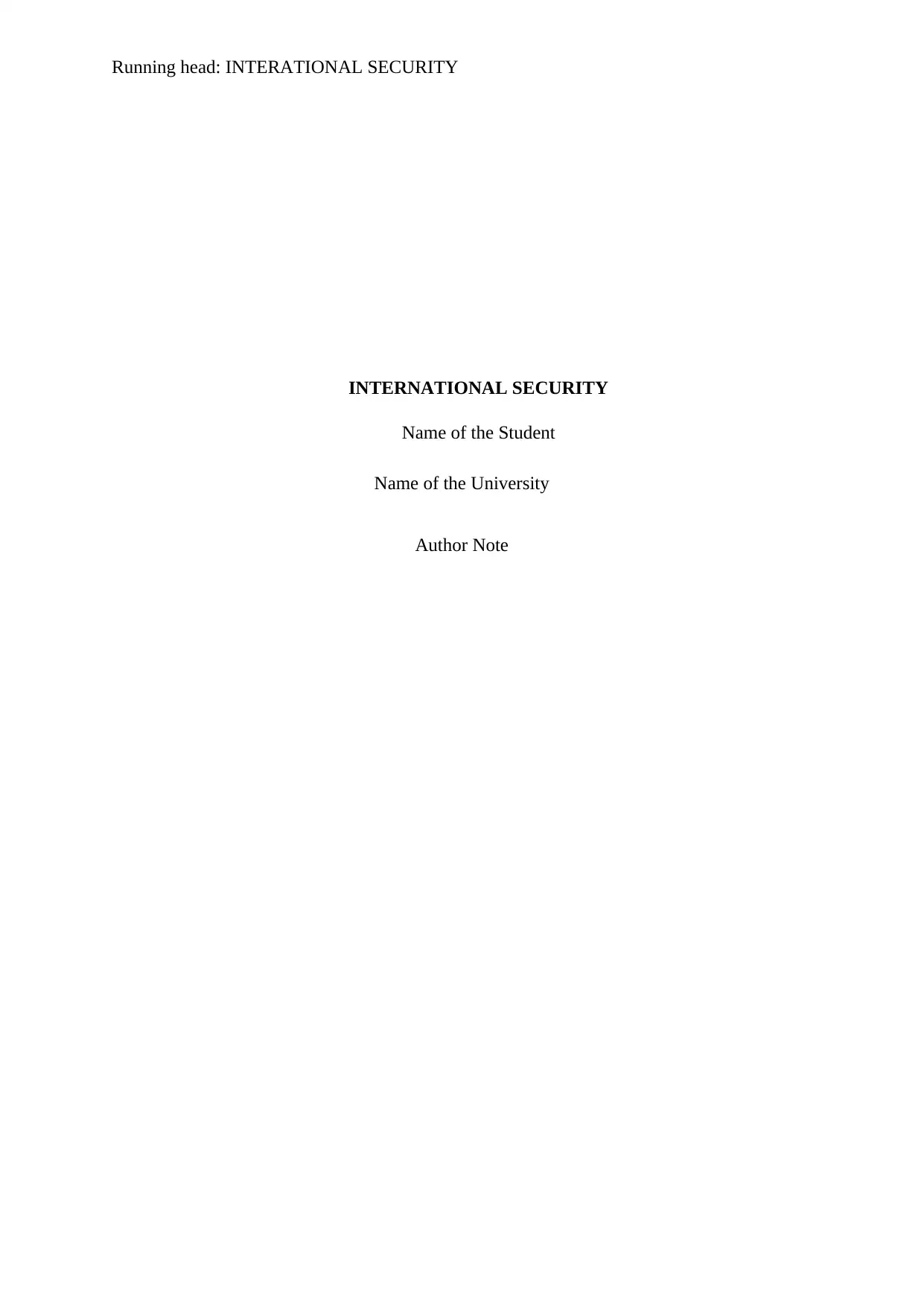
Running head: INTERATIONAL SECURITY
INTERNATIONAL SECURITY
Name of the Student
Name of the University
Author Note
INTERNATIONAL SECURITY
Name of the Student
Name of the University
Author Note
Secure Best Marks with AI Grader
Need help grading? Try our AI Grader for instant feedback on your assignments.
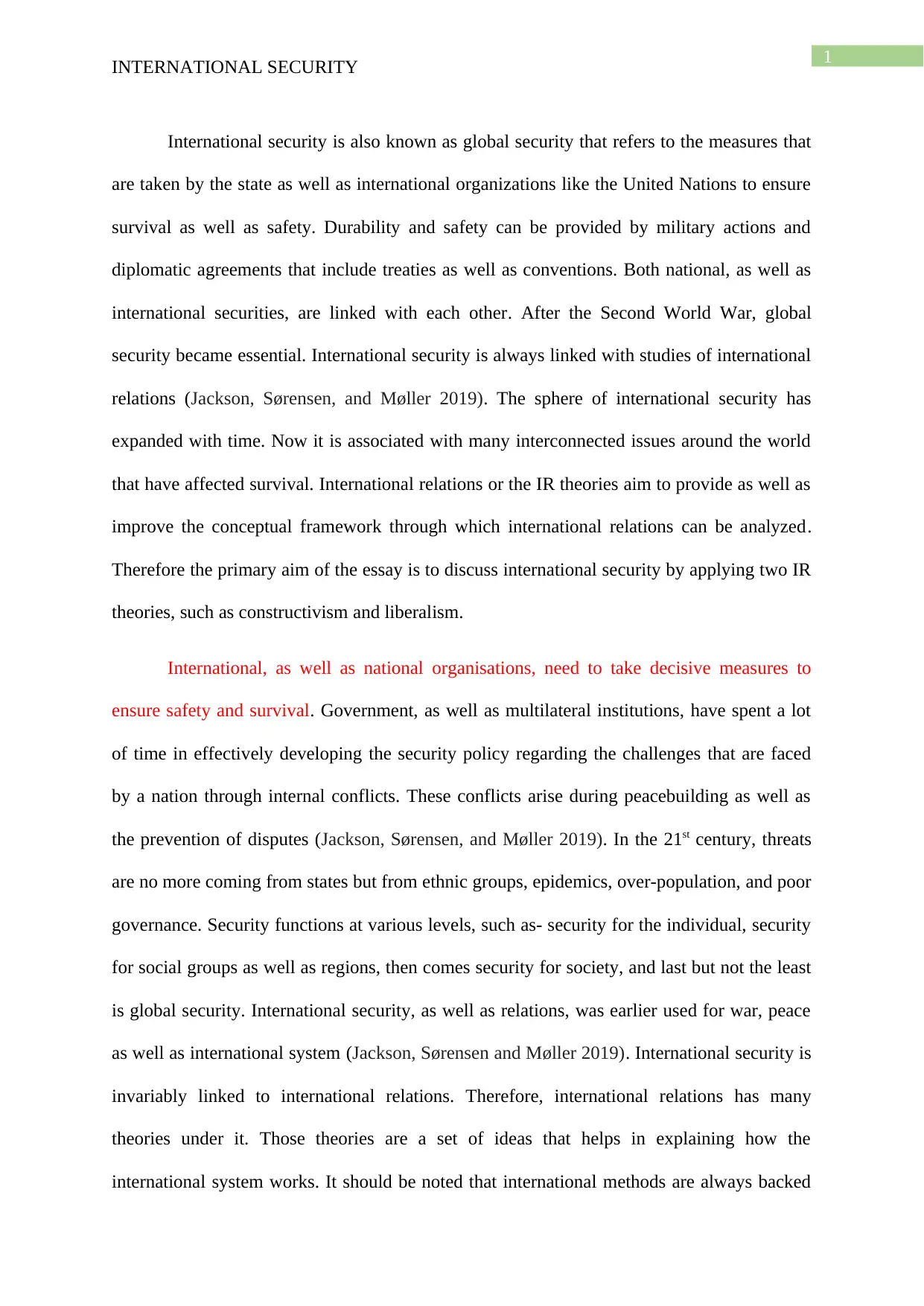
1
INTERNATIONAL SECURITY
International security is also known as global security that refers to the measures that
are taken by the state as well as international organizations like the United Nations to ensure
survival as well as safety. Durability and safety can be provided by military actions and
diplomatic agreements that include treaties as well as conventions. Both national, as well as
international securities, are linked with each other. After the Second World War, global
security became essential. International security is always linked with studies of international
relations (Jackson, Sørensen, and Møller 2019). The sphere of international security has
expanded with time. Now it is associated with many interconnected issues around the world
that have affected survival. International relations or the IR theories aim to provide as well as
improve the conceptual framework through which international relations can be analyzed.
Therefore the primary aim of the essay is to discuss international security by applying two IR
theories, such as constructivism and liberalism.
International, as well as national organisations, need to take decisive measures to
ensure safety and survival. Government, as well as multilateral institutions, have spent a lot
of time in effectively developing the security policy regarding the challenges that are faced
by a nation through internal conflicts. These conflicts arise during peacebuilding as well as
the prevention of disputes (Jackson, Sørensen, and Møller 2019). In the 21st century, threats
are no more coming from states but from ethnic groups, epidemics, over-population, and poor
governance. Security functions at various levels, such as- security for the individual, security
for social groups as well as regions, then comes security for society, and last but not the least
is global security. International security, as well as relations, was earlier used for war, peace
as well as international system (Jackson, Sørensen and Møller 2019). International security is
invariably linked to international relations. Therefore, international relations has many
theories under it. Those theories are a set of ideas that helps in explaining how the
international system works. It should be noted that international methods are always backed
INTERNATIONAL SECURITY
International security is also known as global security that refers to the measures that
are taken by the state as well as international organizations like the United Nations to ensure
survival as well as safety. Durability and safety can be provided by military actions and
diplomatic agreements that include treaties as well as conventions. Both national, as well as
international securities, are linked with each other. After the Second World War, global
security became essential. International security is always linked with studies of international
relations (Jackson, Sørensen, and Møller 2019). The sphere of international security has
expanded with time. Now it is associated with many interconnected issues around the world
that have affected survival. International relations or the IR theories aim to provide as well as
improve the conceptual framework through which international relations can be analyzed.
Therefore the primary aim of the essay is to discuss international security by applying two IR
theories, such as constructivism and liberalism.
International, as well as national organisations, need to take decisive measures to
ensure safety and survival. Government, as well as multilateral institutions, have spent a lot
of time in effectively developing the security policy regarding the challenges that are faced
by a nation through internal conflicts. These conflicts arise during peacebuilding as well as
the prevention of disputes (Jackson, Sørensen, and Møller 2019). In the 21st century, threats
are no more coming from states but from ethnic groups, epidemics, over-population, and poor
governance. Security functions at various levels, such as- security for the individual, security
for social groups as well as regions, then comes security for society, and last but not the least
is global security. International security, as well as relations, was earlier used for war, peace
as well as international system (Jackson, Sørensen and Møller 2019). International security is
invariably linked to international relations. Therefore, international relations has many
theories under it. Those theories are a set of ideas that helps in explaining how the
international system works. It should be noted that international methods are always backed
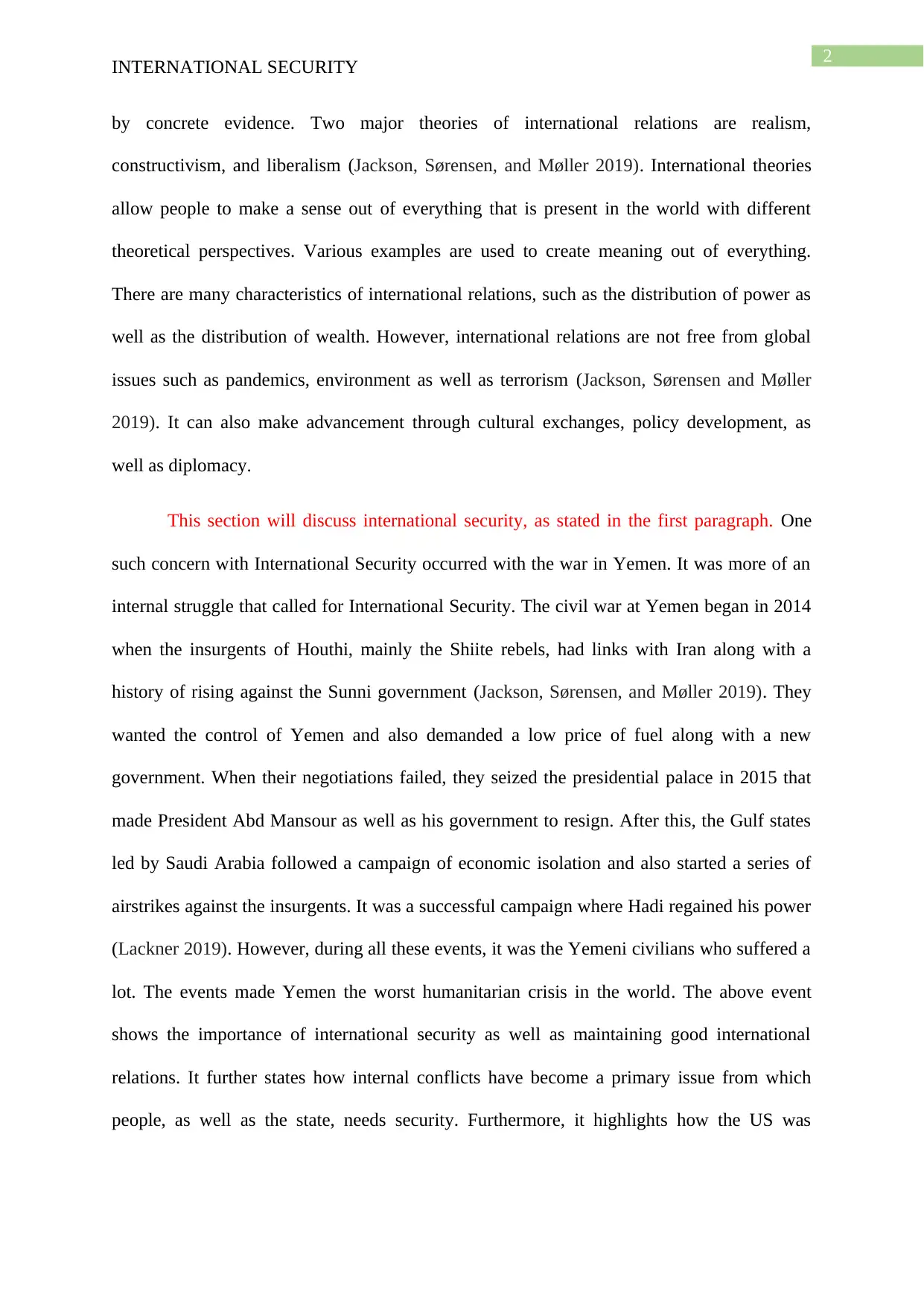
2
INTERNATIONAL SECURITY
by concrete evidence. Two major theories of international relations are realism,
constructivism, and liberalism (Jackson, Sørensen, and Møller 2019). International theories
allow people to make a sense out of everything that is present in the world with different
theoretical perspectives. Various examples are used to create meaning out of everything.
There are many characteristics of international relations, such as the distribution of power as
well as the distribution of wealth. However, international relations are not free from global
issues such as pandemics, environment as well as terrorism (Jackson, Sørensen and Møller
2019). It can also make advancement through cultural exchanges, policy development, as
well as diplomacy.
This section will discuss international security, as stated in the first paragraph. One
such concern with International Security occurred with the war in Yemen. It was more of an
internal struggle that called for International Security. The civil war at Yemen began in 2014
when the insurgents of Houthi, mainly the Shiite rebels, had links with Iran along with a
history of rising against the Sunni government (Jackson, Sørensen, and Møller 2019). They
wanted the control of Yemen and also demanded a low price of fuel along with a new
government. When their negotiations failed, they seized the presidential palace in 2015 that
made President Abd Mansour as well as his government to resign. After this, the Gulf states
led by Saudi Arabia followed a campaign of economic isolation and also started a series of
airstrikes against the insurgents. It was a successful campaign where Hadi regained his power
(Lackner 2019). However, during all these events, it was the Yemeni civilians who suffered a
lot. The events made Yemen the worst humanitarian crisis in the world. The above event
shows the importance of international security as well as maintaining good international
relations. It further states how internal conflicts have become a primary issue from which
people, as well as the state, needs security. Furthermore, it highlights how the US was
INTERNATIONAL SECURITY
by concrete evidence. Two major theories of international relations are realism,
constructivism, and liberalism (Jackson, Sørensen, and Møller 2019). International theories
allow people to make a sense out of everything that is present in the world with different
theoretical perspectives. Various examples are used to create meaning out of everything.
There are many characteristics of international relations, such as the distribution of power as
well as the distribution of wealth. However, international relations are not free from global
issues such as pandemics, environment as well as terrorism (Jackson, Sørensen and Møller
2019). It can also make advancement through cultural exchanges, policy development, as
well as diplomacy.
This section will discuss international security, as stated in the first paragraph. One
such concern with International Security occurred with the war in Yemen. It was more of an
internal struggle that called for International Security. The civil war at Yemen began in 2014
when the insurgents of Houthi, mainly the Shiite rebels, had links with Iran along with a
history of rising against the Sunni government (Jackson, Sørensen, and Møller 2019). They
wanted the control of Yemen and also demanded a low price of fuel along with a new
government. When their negotiations failed, they seized the presidential palace in 2015 that
made President Abd Mansour as well as his government to resign. After this, the Gulf states
led by Saudi Arabia followed a campaign of economic isolation and also started a series of
airstrikes against the insurgents. It was a successful campaign where Hadi regained his power
(Lackner 2019). However, during all these events, it was the Yemeni civilians who suffered a
lot. The events made Yemen the worst humanitarian crisis in the world. The above event
shows the importance of international security as well as maintaining good international
relations. It further states how internal conflicts have become a primary issue from which
people, as well as the state, needs security. Furthermore, it highlights how the US was
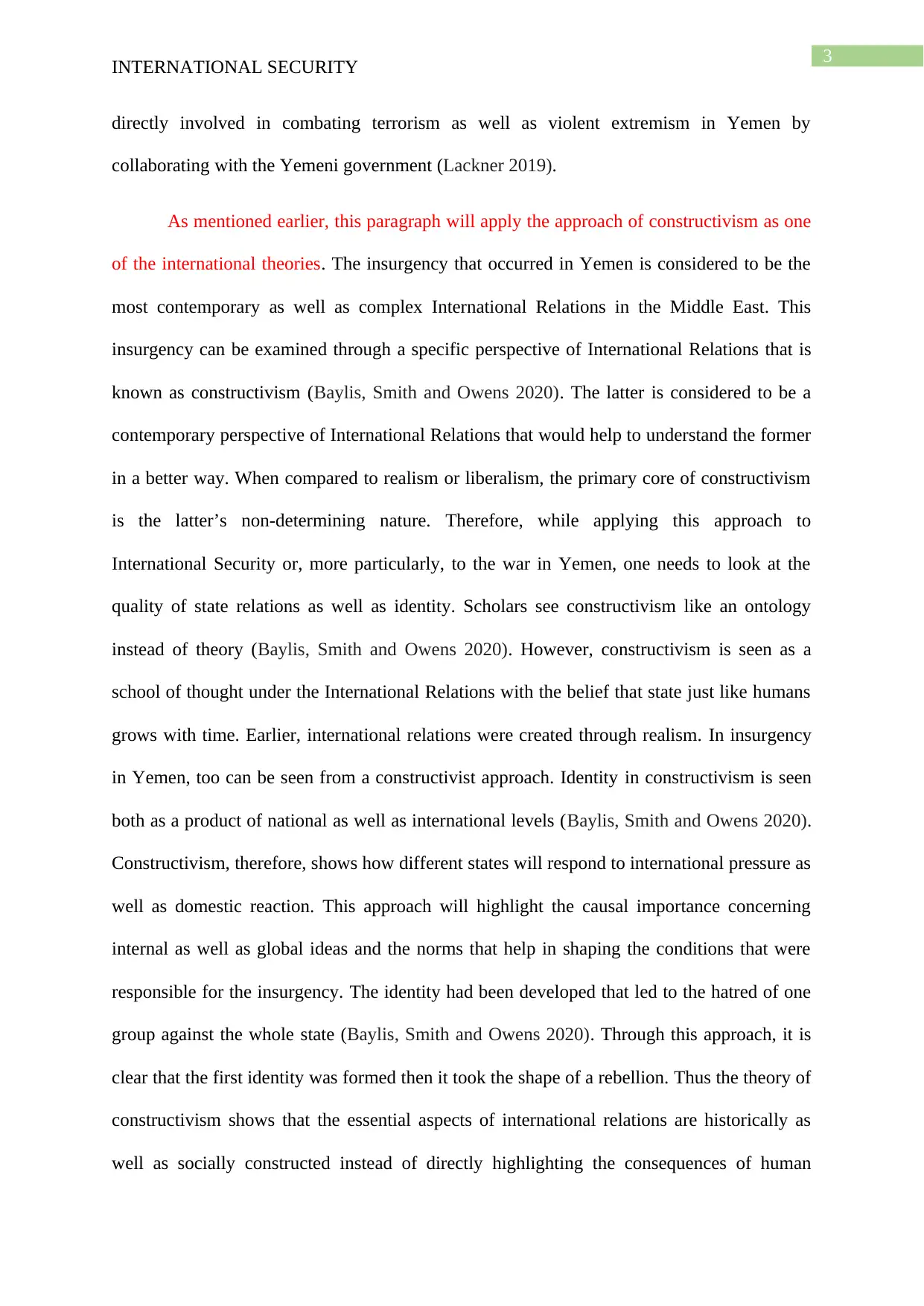
3
INTERNATIONAL SECURITY
directly involved in combating terrorism as well as violent extremism in Yemen by
collaborating with the Yemeni government (Lackner 2019).
As mentioned earlier, this paragraph will apply the approach of constructivism as one
of the international theories. The insurgency that occurred in Yemen is considered to be the
most contemporary as well as complex International Relations in the Middle East. This
insurgency can be examined through a specific perspective of International Relations that is
known as constructivism (Baylis, Smith and Owens 2020). The latter is considered to be a
contemporary perspective of International Relations that would help to understand the former
in a better way. When compared to realism or liberalism, the primary core of constructivism
is the latter’s non-determining nature. Therefore, while applying this approach to
International Security or, more particularly, to the war in Yemen, one needs to look at the
quality of state relations as well as identity. Scholars see constructivism like an ontology
instead of theory (Baylis, Smith and Owens 2020). However, constructivism is seen as a
school of thought under the International Relations with the belief that state just like humans
grows with time. Earlier, international relations were created through realism. In insurgency
in Yemen, too can be seen from a constructivist approach. Identity in constructivism is seen
both as a product of national as well as international levels (Baylis, Smith and Owens 2020).
Constructivism, therefore, shows how different states will respond to international pressure as
well as domestic reaction. This approach will highlight the causal importance concerning
internal as well as global ideas and the norms that help in shaping the conditions that were
responsible for the insurgency. The identity had been developed that led to the hatred of one
group against the whole state (Baylis, Smith and Owens 2020). Through this approach, it is
clear that the first identity was formed then it took the shape of a rebellion. Thus the theory of
constructivism shows that the essential aspects of international relations are historically as
well as socially constructed instead of directly highlighting the consequences of human
INTERNATIONAL SECURITY
directly involved in combating terrorism as well as violent extremism in Yemen by
collaborating with the Yemeni government (Lackner 2019).
As mentioned earlier, this paragraph will apply the approach of constructivism as one
of the international theories. The insurgency that occurred in Yemen is considered to be the
most contemporary as well as complex International Relations in the Middle East. This
insurgency can be examined through a specific perspective of International Relations that is
known as constructivism (Baylis, Smith and Owens 2020). The latter is considered to be a
contemporary perspective of International Relations that would help to understand the former
in a better way. When compared to realism or liberalism, the primary core of constructivism
is the latter’s non-determining nature. Therefore, while applying this approach to
International Security or, more particularly, to the war in Yemen, one needs to look at the
quality of state relations as well as identity. Scholars see constructivism like an ontology
instead of theory (Baylis, Smith and Owens 2020). However, constructivism is seen as a
school of thought under the International Relations with the belief that state just like humans
grows with time. Earlier, international relations were created through realism. In insurgency
in Yemen, too can be seen from a constructivist approach. Identity in constructivism is seen
both as a product of national as well as international levels (Baylis, Smith and Owens 2020).
Constructivism, therefore, shows how different states will respond to international pressure as
well as domestic reaction. This approach will highlight the causal importance concerning
internal as well as global ideas and the norms that help in shaping the conditions that were
responsible for the insurgency. The identity had been developed that led to the hatred of one
group against the whole state (Baylis, Smith and Owens 2020). Through this approach, it is
clear that the first identity was formed then it took the shape of a rebellion. Thus the theory of
constructivism shows that the essential aspects of international relations are historically as
well as socially constructed instead of directly highlighting the consequences of human
Secure Best Marks with AI Grader
Need help grading? Try our AI Grader for instant feedback on your assignments.
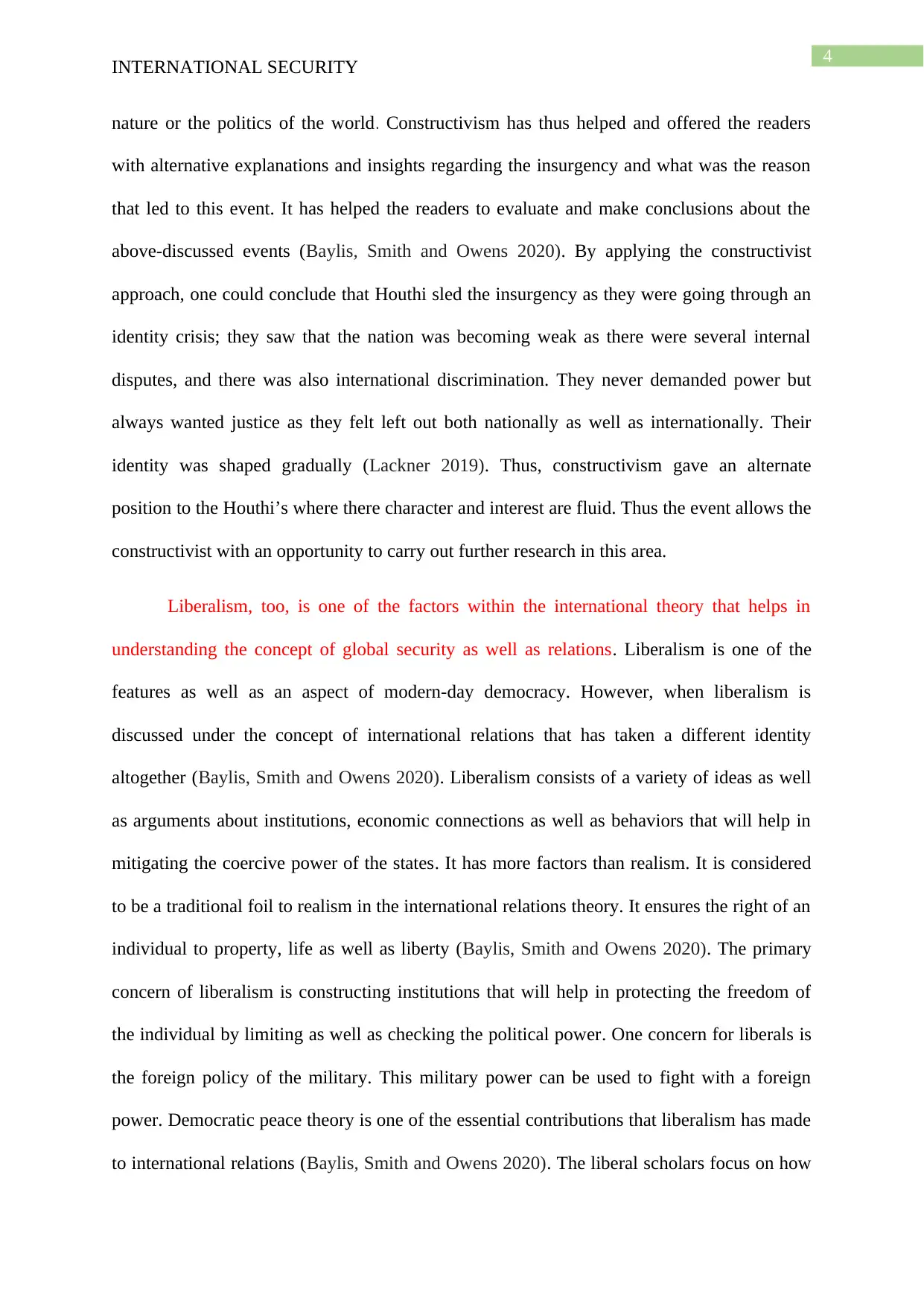
4
INTERNATIONAL SECURITY
nature or the politics of the world. Constructivism has thus helped and offered the readers
with alternative explanations and insights regarding the insurgency and what was the reason
that led to this event. It has helped the readers to evaluate and make conclusions about the
above-discussed events (Baylis, Smith and Owens 2020). By applying the constructivist
approach, one could conclude that Houthi sled the insurgency as they were going through an
identity crisis; they saw that the nation was becoming weak as there were several internal
disputes, and there was also international discrimination. They never demanded power but
always wanted justice as they felt left out both nationally as well as internationally. Their
identity was shaped gradually (Lackner 2019). Thus, constructivism gave an alternate
position to the Houthi’s where there character and interest are fluid. Thus the event allows the
constructivist with an opportunity to carry out further research in this area.
Liberalism, too, is one of the factors within the international theory that helps in
understanding the concept of global security as well as relations. Liberalism is one of the
features as well as an aspect of modern-day democracy. However, when liberalism is
discussed under the concept of international relations that has taken a different identity
altogether (Baylis, Smith and Owens 2020). Liberalism consists of a variety of ideas as well
as arguments about institutions, economic connections as well as behaviors that will help in
mitigating the coercive power of the states. It has more factors than realism. It is considered
to be a traditional foil to realism in the international relations theory. It ensures the right of an
individual to property, life as well as liberty (Baylis, Smith and Owens 2020). The primary
concern of liberalism is constructing institutions that will help in protecting the freedom of
the individual by limiting as well as checking the political power. One concern for liberals is
the foreign policy of the military. This military power can be used to fight with a foreign
power. Democratic peace theory is one of the essential contributions that liberalism has made
to international relations (Baylis, Smith and Owens 2020). The liberal scholars focus on how
INTERNATIONAL SECURITY
nature or the politics of the world. Constructivism has thus helped and offered the readers
with alternative explanations and insights regarding the insurgency and what was the reason
that led to this event. It has helped the readers to evaluate and make conclusions about the
above-discussed events (Baylis, Smith and Owens 2020). By applying the constructivist
approach, one could conclude that Houthi sled the insurgency as they were going through an
identity crisis; they saw that the nation was becoming weak as there were several internal
disputes, and there was also international discrimination. They never demanded power but
always wanted justice as they felt left out both nationally as well as internationally. Their
identity was shaped gradually (Lackner 2019). Thus, constructivism gave an alternate
position to the Houthi’s where there character and interest are fluid. Thus the event allows the
constructivist with an opportunity to carry out further research in this area.
Liberalism, too, is one of the factors within the international theory that helps in
understanding the concept of global security as well as relations. Liberalism is one of the
features as well as an aspect of modern-day democracy. However, when liberalism is
discussed under the concept of international relations that has taken a different identity
altogether (Baylis, Smith and Owens 2020). Liberalism consists of a variety of ideas as well
as arguments about institutions, economic connections as well as behaviors that will help in
mitigating the coercive power of the states. It has more factors than realism. It is considered
to be a traditional foil to realism in the international relations theory. It ensures the right of an
individual to property, life as well as liberty (Baylis, Smith and Owens 2020). The primary
concern of liberalism is constructing institutions that will help in protecting the freedom of
the individual by limiting as well as checking the political power. One concern for liberals is
the foreign policy of the military. This military power can be used to fight with a foreign
power. Democratic peace theory is one of the essential contributions that liberalism has made
to international relations (Baylis, Smith and Owens 2020). The liberal scholars focus on how
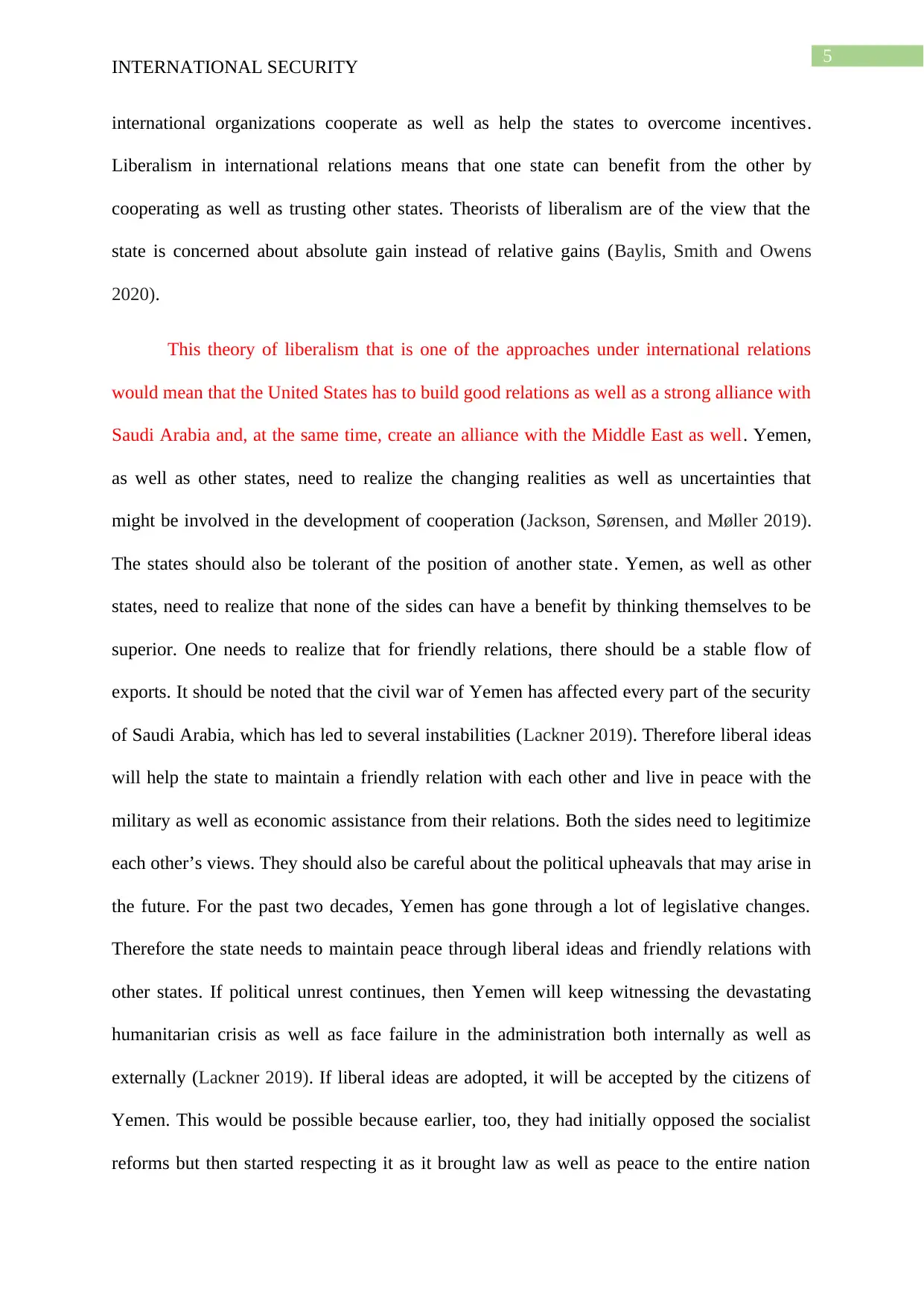
5
INTERNATIONAL SECURITY
international organizations cooperate as well as help the states to overcome incentives.
Liberalism in international relations means that one state can benefit from the other by
cooperating as well as trusting other states. Theorists of liberalism are of the view that the
state is concerned about absolute gain instead of relative gains (Baylis, Smith and Owens
2020).
This theory of liberalism that is one of the approaches under international relations
would mean that the United States has to build good relations as well as a strong alliance with
Saudi Arabia and, at the same time, create an alliance with the Middle East as well. Yemen,
as well as other states, need to realize the changing realities as well as uncertainties that
might be involved in the development of cooperation (Jackson, Sørensen, and Møller 2019).
The states should also be tolerant of the position of another state. Yemen, as well as other
states, need to realize that none of the sides can have a benefit by thinking themselves to be
superior. One needs to realize that for friendly relations, there should be a stable flow of
exports. It should be noted that the civil war of Yemen has affected every part of the security
of Saudi Arabia, which has led to several instabilities (Lackner 2019). Therefore liberal ideas
will help the state to maintain a friendly relation with each other and live in peace with the
military as well as economic assistance from their relations. Both the sides need to legitimize
each other’s views. They should also be careful about the political upheavals that may arise in
the future. For the past two decades, Yemen has gone through a lot of legislative changes.
Therefore the state needs to maintain peace through liberal ideas and friendly relations with
other states. If political unrest continues, then Yemen will keep witnessing the devastating
humanitarian crisis as well as face failure in the administration both internally as well as
externally (Lackner 2019). If liberal ideas are adopted, it will be accepted by the citizens of
Yemen. This would be possible because earlier, too, they had initially opposed the socialist
reforms but then started respecting it as it brought law as well as peace to the entire nation
INTERNATIONAL SECURITY
international organizations cooperate as well as help the states to overcome incentives.
Liberalism in international relations means that one state can benefit from the other by
cooperating as well as trusting other states. Theorists of liberalism are of the view that the
state is concerned about absolute gain instead of relative gains (Baylis, Smith and Owens
2020).
This theory of liberalism that is one of the approaches under international relations
would mean that the United States has to build good relations as well as a strong alliance with
Saudi Arabia and, at the same time, create an alliance with the Middle East as well. Yemen,
as well as other states, need to realize the changing realities as well as uncertainties that
might be involved in the development of cooperation (Jackson, Sørensen, and Møller 2019).
The states should also be tolerant of the position of another state. Yemen, as well as other
states, need to realize that none of the sides can have a benefit by thinking themselves to be
superior. One needs to realize that for friendly relations, there should be a stable flow of
exports. It should be noted that the civil war of Yemen has affected every part of the security
of Saudi Arabia, which has led to several instabilities (Lackner 2019). Therefore liberal ideas
will help the state to maintain a friendly relation with each other and live in peace with the
military as well as economic assistance from their relations. Both the sides need to legitimize
each other’s views. They should also be careful about the political upheavals that may arise in
the future. For the past two decades, Yemen has gone through a lot of legislative changes.
Therefore the state needs to maintain peace through liberal ideas and friendly relations with
other states. If political unrest continues, then Yemen will keep witnessing the devastating
humanitarian crisis as well as face failure in the administration both internally as well as
externally (Lackner 2019). If liberal ideas are adopted, it will be accepted by the citizens of
Yemen. This would be possible because earlier, too, they had initially opposed the socialist
reforms but then started respecting it as it brought law as well as peace to the entire nation
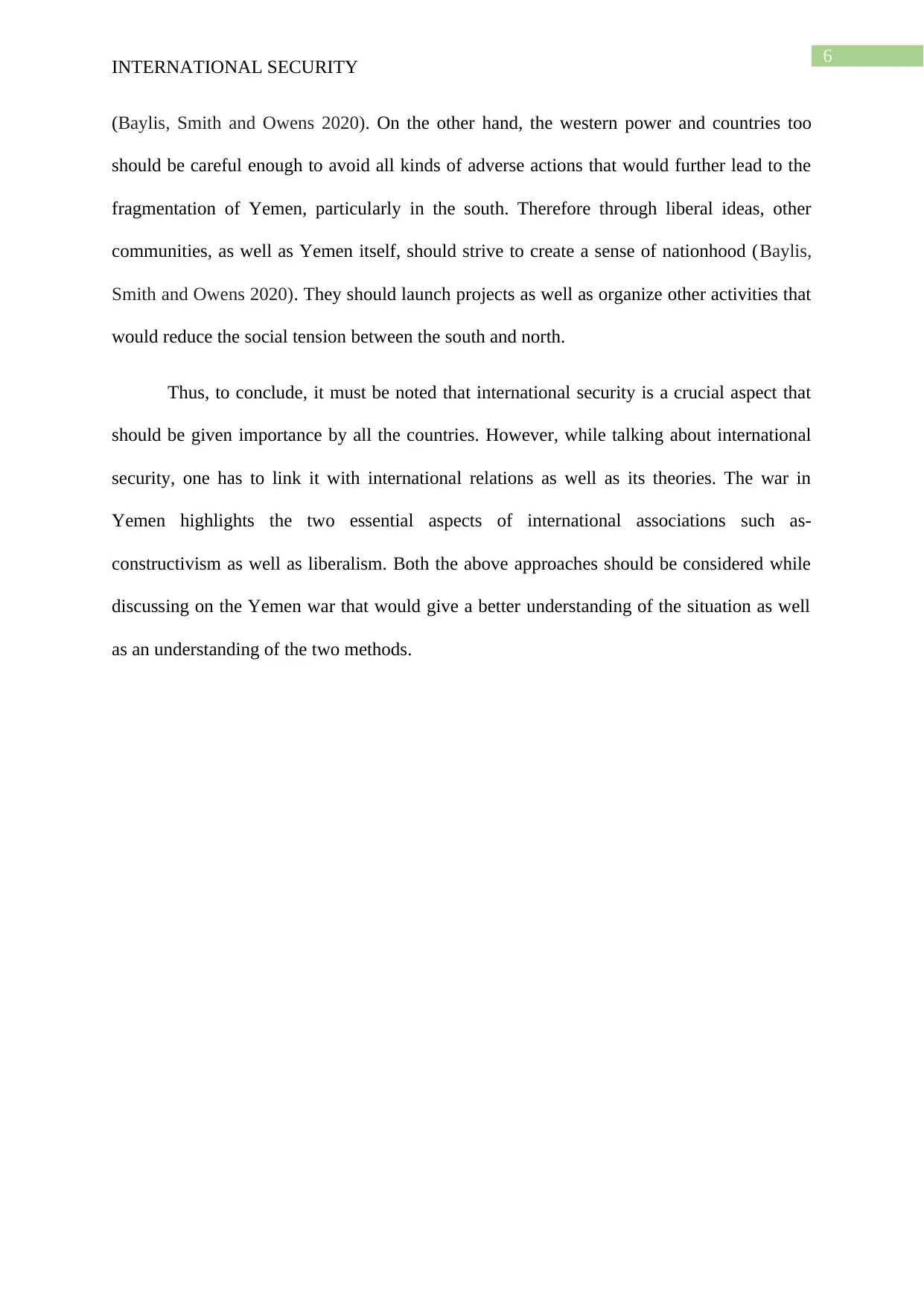
6
INTERNATIONAL SECURITY
(Baylis, Smith and Owens 2020). On the other hand, the western power and countries too
should be careful enough to avoid all kinds of adverse actions that would further lead to the
fragmentation of Yemen, particularly in the south. Therefore through liberal ideas, other
communities, as well as Yemen itself, should strive to create a sense of nationhood (Baylis,
Smith and Owens 2020). They should launch projects as well as organize other activities that
would reduce the social tension between the south and north.
Thus, to conclude, it must be noted that international security is a crucial aspect that
should be given importance by all the countries. However, while talking about international
security, one has to link it with international relations as well as its theories. The war in
Yemen highlights the two essential aspects of international associations such as-
constructivism as well as liberalism. Both the above approaches should be considered while
discussing on the Yemen war that would give a better understanding of the situation as well
as an understanding of the two methods.
INTERNATIONAL SECURITY
(Baylis, Smith and Owens 2020). On the other hand, the western power and countries too
should be careful enough to avoid all kinds of adverse actions that would further lead to the
fragmentation of Yemen, particularly in the south. Therefore through liberal ideas, other
communities, as well as Yemen itself, should strive to create a sense of nationhood (Baylis,
Smith and Owens 2020). They should launch projects as well as organize other activities that
would reduce the social tension between the south and north.
Thus, to conclude, it must be noted that international security is a crucial aspect that
should be given importance by all the countries. However, while talking about international
security, one has to link it with international relations as well as its theories. The war in
Yemen highlights the two essential aspects of international associations such as-
constructivism as well as liberalism. Both the above approaches should be considered while
discussing on the Yemen war that would give a better understanding of the situation as well
as an understanding of the two methods.
Paraphrase This Document
Need a fresh take? Get an instant paraphrase of this document with our AI Paraphraser
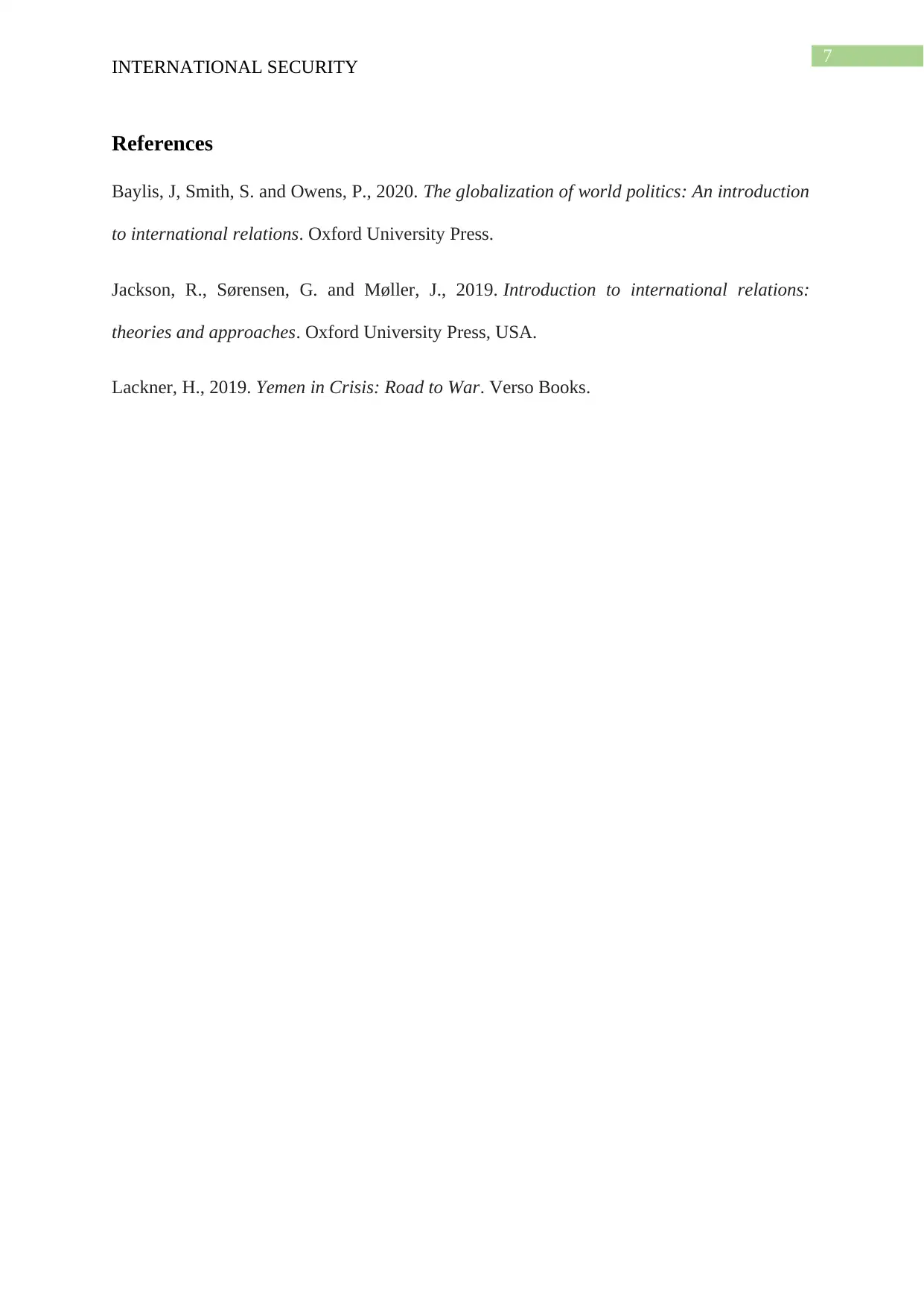
7
INTERNATIONAL SECURITY
References
Baylis, J, Smith, S. and Owens, P., 2020. The globalization of world politics: An introduction
to international relations. Oxford University Press.
Jackson, R., Sørensen, G. and Møller, J., 2019. Introduction to international relations:
theories and approaches. Oxford University Press, USA.
Lackner, H., 2019. Yemen in Crisis: Road to War. Verso Books.
INTERNATIONAL SECURITY
References
Baylis, J, Smith, S. and Owens, P., 2020. The globalization of world politics: An introduction
to international relations. Oxford University Press.
Jackson, R., Sørensen, G. and Møller, J., 2019. Introduction to international relations:
theories and approaches. Oxford University Press, USA.
Lackner, H., 2019. Yemen in Crisis: Road to War. Verso Books.
1 out of 8
Related Documents
Your All-in-One AI-Powered Toolkit for Academic Success.
+13062052269
info@desklib.com
Available 24*7 on WhatsApp / Email
![[object Object]](/_next/static/media/star-bottom.7253800d.svg)
Unlock your academic potential
© 2024 | Zucol Services PVT LTD | All rights reserved.





